On Thursday, a U.S. federal judge ruled that the Social Security Administration (SSA) likely violated privacy laws. The agency had allowed Elon Musk’s Department of Government Efficiency (DOGE) team to access millions of Americans’ personal data. As a result, the judge immediately ordered the agency to stop sharing records.
Judge Ellen Lipton Hollander from Maryland acknowledged that fighting fraud and waste is important. However, she emphasized that it does not justify breaking privacy laws. Moreover, she accused the government of overstepping legal boundaries in its efforts.
The case further revealed that DOGE accessed highly sensitive information stored in SSA’s databases. Specifically, the Numident system holds details on everyone who has applied for a social security number since the 1930s. Notably, this database stores Social Security numbers, medical and mental health records, driver’s license details, bank account data, tax records, and employment history.
In response, two labor unions and the advocacy group Democracy Forward filed the lawsuit. They claimed the agency had placed DOGE staffers without proper background checks or training. Additionally, the group’s CEO, Skye Perryman, welcomed the ruling and called it a win for data privacy. She also urged DOGE to erase all unlawfully accessed data and warned about the dangers of their reckless actions.
Judge Hollander also pointed out that SSA leadership gave 10 DOGE staffers full access to massive records without proper oversight. Nevertheless, she described DOGE’s data search as a “fishing expedition” without clear evidence of widespread fraud.
The White House criticized the ruling. Spokesperson Harrison Fields accused the judge of blocking President Donald Trump’s efforts to eliminate waste and fraud. Finally, he said the administration would explore all legal options to challenge the decision.
The court also noted that DOGE staffers received anonymity in the case due to safety concerns. However, the judge criticized the defense for disregarding the privacy of millions of Americans whose data they exposed without consent.










